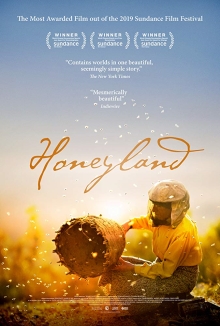
This is described as being a documentary out of Macedonia and it is certainly the first Macedonian film we’ve ever watched. However despite the cinéma vérité shooting method, it’s barely possible to believe that this is a documentary as it has characters, a plot and even a proper dramatic arc. Reading up on it, it seems that the filmmakers insist that it’s a documentary as the original intention was to make a film about the region but when they met Hatidže Muratova they realized that her personal story was too good not to tell.
Hatidže lives alone with her infirm mother in a hut out near a mountain with neither running water nor electricity. She survives mainly by harvesting honey from wild bees which she both consumes and sells in the capital of Skopje. Her usual routines are disrupted however when a ranching family moves in nearby with a trailer, several children and many farm animals. She befriends them and soon the children are playing in her house and with her cats. The head of the family Hussein is curious about her bees and Hatidže teaches him her methods, all the while warning him that half of the honey must always be left for the bees. Hussein thus brings in bees to start his own hives but pressured by his customer and perhaps financier, he overharvests the honey. Meanwhile Hatidže continues to care for her ailing mother whose condition deteriorates.
As you can see, this feels much more like a movie than a documentary as even the central theme of being careful of over exploiting natural resources seems too neat and tidy to be entirely unplanned. However all indications are that the circumstances being filmed truly are a remarkable confluence of random events as neither Hatidže nor the directors Tamara Kotevska and Ljubomir Stefanov expected the arrival of the neighbors. You can even see how the filming style changes when they needed to cover the neighbors, switching from a more stately nature documentary style to a more casual home video style. Of course a lot of it is due to the editing as well. While the documentary seems to show roughly a year of Hatidže’s life, the reality was that this was shot over a period of three years. In any case, this truly is an extraordinary film that fully deserves all of the plaudits it has earned on the international arena. The fact that it’s real lends tremendous power to its environmentalist message even if you’re the cynical type.
Even so, my favorite bits are the little details of Hatidže’s lifestyle such as her using the proceeds from selling her honey to buy bananas and a folding fan for her mother or delighting in hearing popular music on the radio after she struggles to get reception. The secondary theme of wondering what sort of future an unmarried woman living on her own like Hatidže is very poignant and perhaps underappreciated. There’s so much understated emotion and I think even resentment when she asks her mother why her family turned away the matchmakers long ago. It is telling that her mother is able to offer no solution to surviving old age other than getting married though both of them realize that Hatidže is far too old to marry. This even ties in with one of Hussein’s sons who grows especially close to Hatidže and asks her what she is going to do. Seeing him admonish his own father for not following her advice about properly handling the bees makes the conservation message feel more real too even as the father keeps complaining that the only reason why he needs more money is because his children make so many demands of him.
In matters of conservation, there is a tension between human population growth and preserving the environment but activists often don’t like to explicitly point it out. I think it is not a coincidence that someone like Hatidže who has no children and has no path to a life better than what she has can so naturally follow the conservative traditions passed down to her while someone like Hussein sees the beekeeping as only a transitory means to an end and does not want his children to stay at a place like that forever. Certainly Hussein and his backer are wrong as this is literally killing the goose that lays the golden eggs but Hatidže’s way of life has no future as well if she ever wants to have a family in the modern era. It’s natural for a documentary like this to celebrate Hatidže as a sort of heroine and this truly is a great documentary. But one should still be mindful of buying in too much into the romanticism and understand that there are good reasons why this way of life is dying out.